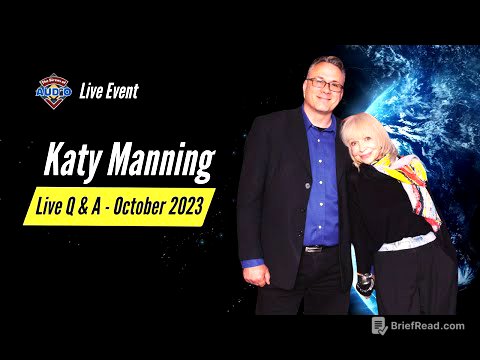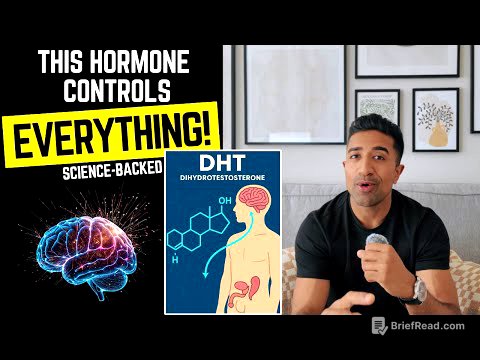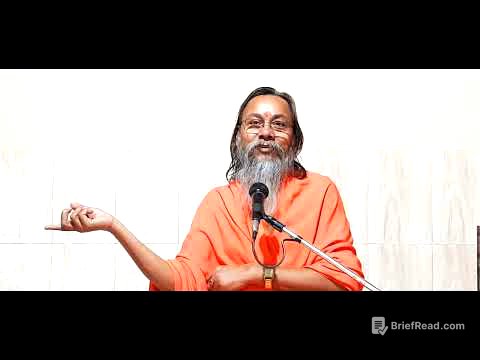TLDR;
This video explores the concept of free will from a neurobiological perspective, arguing against its existence. It examines how unconscious factors, quantum mechanics, and determinism influence behavior, and discusses the implications of a no-free-will worldview on morality, the justice system, and personal motivation. The conversation also addresses mental health, the interplay between science and philosophy, and the potential for societal change through a deeper understanding of biology.
- Free will is questioned from a neurobiological perspective, suggesting our actions are determined by prior causes and brain chemistry.
- Unconscious factors, like smells or background music, significantly influence our behavior without our awareness.
- Quantum mechanics is refuted as a basis for free will due to scale and consistency issues.
- The implications of no free will on the justice system, motivation, and societal norms are discussed.
- Mental health, particularly depression, is addressed as a biological disorder, emphasizing the importance of treatment and societal understanding.
Defining Free Will [0:08]
The discussion starts by defining free will in a reductive way, questioning the origin of a neuron's firing that initiates a behavior. The key point is whether a neuron can fire without any prior causal reason, regulated by the physical laws of the universe. The speaker asserts that neurobiology has not found any causeless cause or any biological event that happens from nowhere. Every biological event has a history, suggesting that the concept of free will, as a causeless cause, does not exist in the biology of our behavior.
Challenging Conscious Thought as Free Will [2:51]
The conversation addresses the idea that conscious, deliberate thought is an example of free will. The speaker refutes this by citing studies showing how unconscious factors influence behavior. Examples include how church music or the smell of cookies can alter attitudes and generosity without individuals being aware of these influences. A study on judges showed that parole decisions were heavily influenced by how recently the judge had eaten, further illustrating the impact of unconscious factors on decision-making.
Quantum Mechanics and Free Will [7:10]
The discussion addresses the argument that quantum mechanics and its inherent randomness could explain free will. The speaker argues against this for three main reasons. First, quantum effects occur at a subatomic level and would need to "bubble up" significantly to influence action potentials in neurons, which is unlikely. Second, quantum indeterminacy could only explain random, out-of-character actions, not the consistency seen in moral behavior. Third, attempts to philosophically link quantum randomness to determinate free will are unconvincing and often rely on scientifically unsound ideas.
Determinism and Predictability [12:38]
The conversation shifts to whether the rejection of free will implies complete determinism. While the speaker personally believes there is no free will, the practical implications are similar whether one believes there is much less free will than we think or none at all. The challenge arises when trying to predict behavior, such as which child raised in poverty will become a criminal. Despite advancements in understanding the biology of behavior, science cannot yet predict individual outcomes with certainty, but the speaker believes that science will continue to advance and reveal biological explanations for what we currently attribute to free will.
Personal Impact of Rejecting Free Will [18:25]
The speaker shares a personal anecdote about realizing there was no God, no free will, and no purpose to life at the age of 13, leading to a lifelong struggle with depression. The speaker acknowledges that this realization can lead to a loss of purpose and comfort that many derive from myths and beliefs. Despite the depressive effects, the speaker believes that pursuing truth is worth the cost.
Depression and Mental Health [21:59]
The discussion addresses a question about living a happy life without medication while suffering from depression and anxiety. The speaker emphasizes that for many, psychotherapy and medication are necessary, working synergistically to combat depression. Medication can provide a foothold, while psychotherapy helps individuals understand the root causes and develop coping strategies. The speaker also cautions against the critique of psychiatric medication, highlighting that untreated clinical depression is a life-threatening disease and not a moral failing.
Science vs. Philosophy [26:50]
The conversation explores the relationship between science and philosophy, noting that while science discovers how things are, philosophy tries to decide what to do with them. The speaker admits to feeling incompetent in philosophy but asserts that a good neuroscientist must know something about philosophy, and vice versa. The speaker criticizes contemporary philosophers who acknowledge neurobiological findings but then dismiss their implications for free will, often invoking non-biological explanations.
The Illusion of Free Will and Its Adaptive Role [35:07]
The discussion turns to whether the feeling of free will is adaptive from an evolutionary perspective. The speaker suggests that it might have initially been a spandrel (a byproduct of other adaptations) but is now adaptive because it helps people get up in the morning and feel part of something bigger than themselves. However, it can also be destructive for those who are considered failures by society, as they are often blamed for their circumstances. The speaker emphasizes that myths, including the myth of free will, can reduce anxiety but also perpetuate harmful beliefs.
Motivation Without Free Will [37:26]
The conversation explores how to stay motivated and find enjoyment in life if one accepts that there is no free will. The speaker admits it's difficult and suggests externalizing sources of pleasure, focusing on the positive impact of one's actions on others rather than personal achievement. The speaker acknowledges the challenge of detaching from a sense of purpose and the difficulty of being consistently selfless.
Historical Shifts in Understanding and Blame [39:18]
The discussion highlights historical examples where societal understanding of diseases shifted, leading to the reduction of blame and the improvement of treatment. The speaker cites the cases of schizophrenia and autism, where mothers were once blamed for causing the conditions in their children. The realization that these are biological disorders led to a reduction in parental guilt and the development of more effective treatments.
Implications for Responsibility and Justice [44:33]
The conversation addresses whether the absence of free will means the absence of responsibility and blame. The speaker argues that blame and praise should be eliminated, but this does not mean that dangerous individuals should be allowed to roam free. Instead, society should focus on fixing "broken brakes," either by rehabilitating individuals or, if that's not possible, by protecting society without assigning blame. The speaker compares this to dealing with a car with faulty brakes, where the focus is on fixing the problem rather than blaming the car.
The Challenge of Eliminating Praise [46:30]
The discussion acknowledges that while it may be difficult to eliminate blame, it is even more challenging to eliminate praise. The speaker points out that if blame and punishment are thrown out, praise and reward must also be discarded. The speaker admits to struggling with this concept, as emotionally arousing situations often lead to forgetting the scientific understanding of behavior.
The Criminal Justice System and Societal Change [49:35]
The conversation explores the implications of no free will on the criminal justice system, suggesting that it should be abolished because it is based on outdated scientific principles. The speaker acknowledges the difficulty of imagining a world where retribution and reward make no sense, but suggests that societal change can happen incrementally. The speaker uses the example of epilepsy, where seizures were once attributed to demonic possession but are now understood as a biological phenomenon, leading to more compassionate and effective interventions.
The "Bad Person" as a "Sick Person" [56:47]
The discussion raises the question of whether every "bad person" is simply "sick." The speaker responds affirmatively, stating that every individual is the outcome of their biological luck, whether good or bad. The speaker equates this to the idea of "just following orders," acknowledging the difficulties this raises in situations like police violence.
Change and Biological Orders [1:00:45]
The conversation emphasizes that while there is no free will, this does not mean that people cannot change. The speaker highlights that organisms change due to circumstances, and the biology of behavior is about the biology of change. The speaker shares a personal anecdote about a bumper sticker prompting a random act of kindness, illustrating how circumstances can alter behavior. The speaker concludes by emphasizing that understanding how we change for the better or worse is crucial, even in the absence of free will.
![Robert Sapolsky: Justice and morality in the absence of free will | Full [Vert Dider] 2020](https://wm-img.halpindev.com/p-briefread_c-10_b-10/urlb/aHR0cDovL2ltZy55b3V0dWJlLmNvbS92aS9uaHZBQXZ3Uy1VQS9tYXhyZXNkZWZhdWx0LmpwZw==.jpg)








